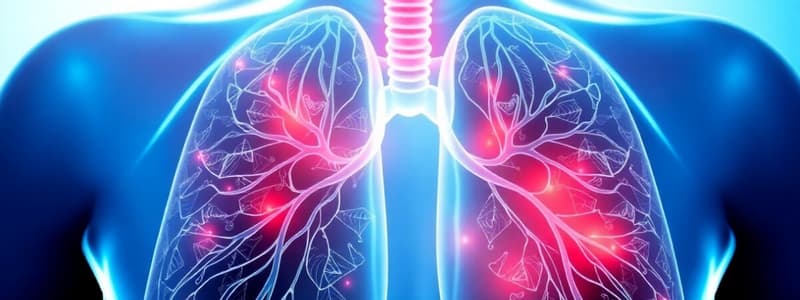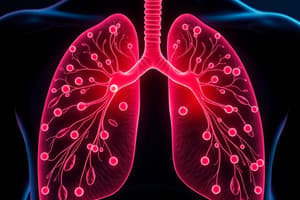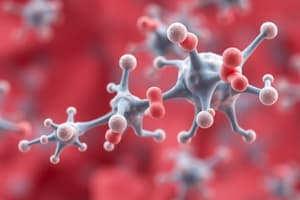Podcast
Questions and Answers
A client with a history of stable COPD is prescribed a beta2-adrenergic agonist. Which of the following medications would be most appropriate for long-term management?
A client with a history of stable COPD is prescribed a beta2-adrenergic agonist. Which of the following medications would be most appropriate for long-term management?
- Levalbuterol
- Albuterol
- Metoprolol
- Salmeterol (correct)
A patient using albuterol inhaler reports needing it more than twice a week. What is the most appropriate action?
A patient using albuterol inhaler reports needing it more than twice a week. What is the most appropriate action?
- Suggest switching to a long-acting beta2-adrenergic agonist immediately.
- Advise the patient to increase the frequency of albuterol use as needed.
- Instruct the patient to notify their healthcare provider for further evaluation. (correct)
- Reassure the patient that occasional overuse is expected during asthma exacerbations.
What is the primary mechanism of action of beta2-adrenergic agonists in treating bronchospasm?
What is the primary mechanism of action of beta2-adrenergic agonists in treating bronchospasm?
- Increasing mucus production to trap irritants in the airways.
- Stimulating alpha-adrenergic receptors to constrict bronchial smooth muscle.
- Blocking histamine release from mast cells in the lungs.
- Stimulating beta2-adrenergic receptors to promote bronchodilation. (correct)
A client with compromised cardiac blood vessels is prescribed a beta2-adrenergic agonist. Which potential adverse effect requires close monitoring?
A client with compromised cardiac blood vessels is prescribed a beta2-adrenergic agonist. Which potential adverse effect requires close monitoring?
A patient experiences increased wheezing and shortness of breath immediately following the administration of a beta2-adrenergic agonist. What is the priority nursing action?
A patient experiences increased wheezing and shortness of breath immediately following the administration of a beta2-adrenergic agonist. What is the priority nursing action?
Which of the following expected physiological responses occurs due to the stimulation of beta2-adrenergic receptors?
Which of the following expected physiological responses occurs due to the stimulation of beta2-adrenergic receptors?
A nurse is educating a client on the appropriate use of albuterol. What should the nurse emphasize regarding its mechanism?
A nurse is educating a client on the appropriate use of albuterol. What should the nurse emphasize regarding its mechanism?
Which of the following is the most important factor to consider when choosing between a SABA and a LABA?
Which of the following is the most important factor to consider when choosing between a SABA and a LABA?
Why is it important for a client using both a beta2-adrenergic agonist and an inhaled glucocorticoid to use the beta2-adrenergic agonist first?
Why is it important for a client using both a beta2-adrenergic agonist and an inhaled glucocorticoid to use the beta2-adrenergic agonist first?
A client with asthma is prescribed albuterol. Which of the following instructions should the nurse include in the client's teaching?
A client with asthma is prescribed albuterol. Which of the following instructions should the nurse include in the client's teaching?
A client with a history of cardiovascular disease is prescribed a beta2-adrenergic agonist. Which of the following assessment findings would warrant immediate notification of the healthcare provider?
A client with a history of cardiovascular disease is prescribed a beta2-adrenergic agonist. Which of the following assessment findings would warrant immediate notification of the healthcare provider?
A client with asthma is starting albuterol. Which pre-existing condition would require the closest monitoring during albuterol therapy?
A client with asthma is starting albuterol. Which pre-existing condition would require the closest monitoring during albuterol therapy?
A client taking a beta2-adrenergic agonist reports increased use of their short-acting inhaler and worsening asthma control. What is the most appropriate nursing action?
A client taking a beta2-adrenergic agonist reports increased use of their short-acting inhaler and worsening asthma control. What is the most appropriate nursing action?
A client is prescribed both albuterol and propranolol. What is the primary concern regarding this combination of medications?
A client is prescribed both albuterol and propranolol. What is the primary concern regarding this combination of medications?
A client with exercise-induced bronchospasm is prescribed a short-acting beta2-adrenergic agonist. When should the client administer the medication in relation to exercise?
A client with exercise-induced bronchospasm is prescribed a short-acting beta2-adrenergic agonist. When should the client administer the medication in relation to exercise?
Which of the following storage instructions is most important to emphasize to a client using a pressurized metered-dose inhaler (MDI)?
Which of the following storage instructions is most important to emphasize to a client using a pressurized metered-dose inhaler (MDI)?
A client who is prescribed a beta2-adrenergic agonist is also taking a monoamine oxidase inhibitor (MAOI). For what adverse effects should the nurse monitor this client most closely?
A client who is prescribed a beta2-adrenergic agonist is also taking a monoamine oxidase inhibitor (MAOI). For what adverse effects should the nurse monitor this client most closely?
What would be the most important instruction for the nurse to give to a client when teaching them about using a new inhaler?
What would be the most important instruction for the nurse to give to a client when teaching them about using a new inhaler?
Flashcards
Beta2-Adrenergic Agonists
Beta2-Adrenergic Agonists
Medications that stimulate beta2-adrenergic receptors, causing bronchodilation.
Uses of Beta2 Agonists
Uses of Beta2 Agonists
Relief of bronchospasms and prevention of exercise-induced bronchospasm (EIB).
Short-Acting Beta2 Agonists (SABA)
Short-Acting Beta2 Agonists (SABA)
Quickly relieve acute bronchospasms; e.g., albuterol.
Long-Acting Beta2 Agonists (LABA)
Long-Acting Beta2 Agonists (LABA)
Signup and view all the flashcards
Albuterol
Albuterol
Signup and view all the flashcards
Action of Beta2 Agonists
Action of Beta2 Agonists
Signup and view all the flashcards
Adverse Effects of Beta2 Agonists
Adverse Effects of Beta2 Agonists
Signup and view all the flashcards
Nursing Considerations for Beta2 Agonists
Nursing Considerations for Beta2 Agonists
Signup and view all the flashcards
Short-Acting Beta2 Agonists
Short-Acting Beta2 Agonists
Signup and view all the flashcards
Long-Acting Beta2 Agonists
Long-Acting Beta2 Agonists
Signup and view all the flashcards
Timing for Exercise-Induced Bronchospasm
Timing for Exercise-Induced Bronchospasm
Signup and view all the flashcards
Inhaler Sequence
Inhaler Sequence
Signup and view all the flashcards
Inhaler Storage
Inhaler Storage
Signup and view all the flashcards
Beta2 Agonist Side Effects
Beta2 Agonist Side Effects
Signup and view all the flashcards
Avoid Which Substance?
Avoid Which Substance?
Signup and view all the flashcards
Asthma Log
Asthma Log
Signup and view all the flashcards
When to Notify Provider (Beta2)
When to Notify Provider (Beta2)
Signup and view all the flashcards
Beta-blocker interaction
Beta-blocker interaction
Signup and view all the flashcards
Study Notes
- Beta2-adrenergic agonists relieve bronchospasms and prevent exercise-induced bronchospasm (EIB).
- Medication selection depends on whether fast relief or long-term management is needed.
- These agonists are classified as either short-acting or long-acting.
Prototype and Other Medications
- Albuterol is the prototype for short-acting beta2-adrenergic agonists (SABA).
- Levalbuterol is another example of a SABA.
- Long-acting beta2-adrenergic agonists (LABAs) include formoterol, salmeterol, terbutaline, vilanterol, and olodaterol.
Expected Pharmacologic Action
- Adrenergic medications stimulate beta2-adrenergic receptors to cause bronchodilation.
- Stimulation of the sympathetic system opens the airways wider.
- They can increase ciliary motility and depress histamine release in the lungs.
- SABAs such as albuterol help the airways of the lungs stay open and last 4 to 6 hr, valuable in the treatment of asthma.
- LABAs such as salmeterol are used in the treatment of clients who have stable COPD and can last up to 12 hr.
Adverse Drug Reactions
- Side effects include tachycardia, heart palpitations, and tremors.
- Angina can occur in clients with compromised cardiac blood vessels.
- Paradoxical bronchospasm can occur.
- Monitor for increased bronchoconstriction manifestations after treatment.
- Overuse of short-acting rescue inhalers (more often than twice a week) needs to be reported to a healthcare provider.
Interventions
- Monitor for tachycardia, heart palpitations, and chest pain.
- Report any findings to the healthcare provider.
Administration
- Beta2-adrenergic agonists can be given orally or by inhalation.
- Short-acting preparations are administered for acute exacerbations.
- Long-acting preparations are given for long-term control.
- For short-acting preparations, it is recommended to give 30 min before exercising to prevent exercise-induced bronchospasm.
- If also taking inhaled glucocorticoids, use the beta2-adrenergic agonists medication first.
- Inhaler medications are dispensed either in a pressurized metered dose inhaler (MDI), inhaled dry powder, a fine mist inhaler, or a nebulizer.
- When storing the MDIs, avoid extremes of temperature.
Safety Alert
- Follow the manufacturer’s instructions when using inhalation devices to ensure the correct medication amount is delivered.
Client Instructions
- Avoid caffeine.
- Report tremors that interfere with activities of daily living to their provider.
- Watch for manifestations and triggers of impending exacerbations of asthma.
- Notify their provider of changes in the pattern of exacerbations of their asthma.
- Keep a log of the frequency and intensity of exacerbations for asthma.
Safety Alert
- Notify their provider if they experience chest pain, heart palpitations, or increase in pulse rate, especially with a history of cardiovascular disease or hypertension, or are taking a digitalis-type medication.
Contraindications and Precautions
- Do not give to clients who are allergic to albuterol.
- Use caution in clients with an allergy to beta2-adrenergic agonists, a history of tachydysrhythmias, or tachycardia due to digitalis toxicity.
- Monitor clients with diabetes mellitus, hyperthyroidism, cardiovascular disease, hypertension, and angina pectoris closely.
Interactions
- Beta-adrenergic blockers reduce the effectiveness of beta2-adrenergic agonists.
- Monoamine oxidase inhibitors (MAOIs) and tricyclic antidepressants increase the risk of hypertension, tachycardia, and angina.
- Hypoglycemic or antidiabetic medications may require increased dosing.
Studying That Suits You
Use AI to generate personalized quizzes and flashcards to suit your learning preferences.




